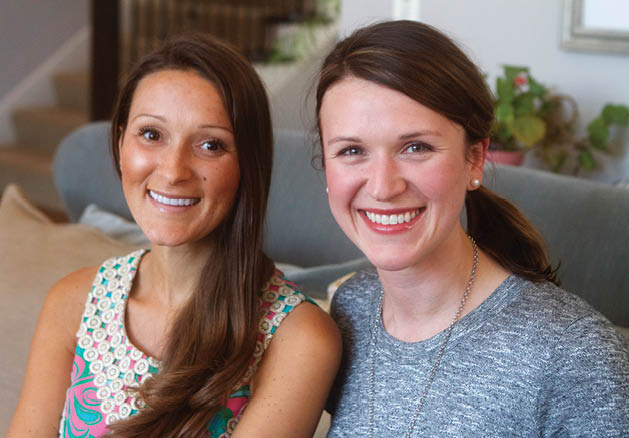- Little Peanut on the Go -
When Karla Lemmon was a full-time software product manager, she often was required to travel internationally. The mother of a young child, she says: “Life [became a] pile of lists, of stuff and how-to’s. There is so much to keep track of, all the gear that goes with a child: bottles, diapers, clothes, toys … And these lists are constantly evolving as the child grows. It can be overwhelming. It’s a challenge most parents are familiar with, whether they are leaving town for the week or simply headed out for the day—whether their tot is in tow or staying behind with a caretaker.”
When Lemmon acquired a smartphone in 2014, she eagerly sought out apps that would facilitate her busy life. “I found an app for everything—except this.” That summer, she began conceptualizing a solution to that problem. The result was an app called Little Peanut On The Go (LPOTG), which gathers all of the vital information that people tend to have “written on scraps of paper rolling around on the counter somewhere,” storing everything from a child’s sleep schedule to the full list of emergency contact numbers in one central and accessible place. Lemmon suggests that LPOTG be used “any time you need a caretaker or a suitcase.”
Lemmon, who holds a bachelor’s degree in mechanical engineering as well as an MBA, says, “The average person, if they come up with an idea for an app, doesn’t necessarily know how to follow through with their idea.” Despite her education and experience, running her new business as a one-woman show has required significant on-the-job learning, as well as an unanticipated amount of time and patience. “That was the biggest surprise,” Lemmon says. “Everything took longer than I thought it would.”
LPOTG got an early boost in November 2014, when Lemmon competed at the local tech conference MobCon. While her business was still in its initial planning phase, Lemmon was selected as one of eight finalists, invited to pitch her concept to the large MobDemo audience. At the end of the night, LPOTG came out on top in the audience vote. “That was a fabulous experience. I knew that my friends weren’t just being nice. [Winning] really validated my idea,” she says.
The app, which launched in April, is free to download. Features like list creation are free to use, while in-app purchases come into play when you share lists with another user, such as a grandparent or babysitter, at a one-time charge of $3.99. “If Grandma doesn’t have a smartphone,” Lemmon adds, “you can [also] send the lists by email.”
Lemmon’s marketing strategy for LPOTG includes now-standard avenues like Facebook and Twitter, as well as more targeted marketing through ads in mom-focused newsletters and reviews on “mommy blogs.” She hopes to generate advertising capital through crowdfunding. Last spring, she launched a campaign on the website plumalley.co (yes, minus the “m”), which is similar to Kickstarter, but focuses on companies created by women, and reached her goal with $7,765 raised.
Lemmon resigned from her day job last April in order to pursue this venture full-time. “I was looking to make a change in my daily life,” Lemmon says. “If it makes me a little money, that’s great. If it takes off … that’s great, too.” She is also constantly thinking of new features to include in later versions, as well as potential extensions or sister apps, such as an LPOTG for pets, or one for parents whose kids are older and have their own mobile devices. Her prime motivation remains helping fellow parents by giving them some peace of mind in their day-to-day life.
- Blossoming Business -
Nikki Anderson of Plymouth is the owner of Blossom Box Kids, a subscription service launched in February 2015 that delivers a month’s worth of activity ideas and materials for children between the ages of 3 and 9.
The concept arose one afternoon in October 2014, when Anderson’s 4-year-old daughter Perla wanted to make a craft while her younger brother took his nap. “I was searching for project ideas [online], and before I knew it, I’d spent 45 minutes —half the length of [my son’s] nap—just searching! I thought, ‘How nice would it be if that were already done for me?’” she says.
Anderson took her idea to her longtime best friend Bethany Wilde. In addition to Wilde’s degree and decade of work experience in early childhood education, Anderson prizes her friend for being “one of the craftiest people [she] know[s].” Before becoming a stay-at-home mother in 2013, Wilde taught at a Montessori school and worked at the University of Minnesota’s Child Development Center. Now a full-time caretaker for her son Simon, who will turn 3 soon, she jumped at the opportunity to put her academic and professional background to use.
Blossom Box Kids has more than 60 monthly subscribers (and blossoming) from across the country. At the start of each month, these subscribers receive a box chock-full of materials and guidelines for craft projects, activities, readings, recipes and fun facts around a given theme. One thing you won’t find in these boxes is an
end result image. Wilde explains: “A lot of craft [kits] are very closed-ended. They show a picture of what it should look like and have step-by-step instructions [that don’t] leave much room for creativity. [That] can dampen a child’s sense of pride.” Anderson and Wilde, both proponents of Montessori-style teaching practices, believe in letting imagination propel creation. “It teaches [children] to be independent and have original thoughts [and] increases their sense of self worth,” Wilde says.
Customers can choose a three-, six- or 12-month subscription, or opt for a more flexible month-to-month plan. Kits can also be purchased on a one-time basis. “[It’s] a great gift option for people who would rather give a child something that promotes doing, rather than just another flashy new toy to add to the playroom,” Anderson says.
The newsletter included in each box includes tips for repurposing common household items like cartons and milk jugs, and Wilde (whose husband playfully accuses her of being a “junk hoarder”) also blogs about new uses for grocery bags, bubble wrap and toilet paper rolls on BBK’s website.
Anderson is no newcomer to entrepreneurship. With her husband, she owns the restaurant chain Peoples Organic and several Dairy Queen franchises. The main challenge with this latest venture was finding affordable shipping rates and suppliers whose materials met their high quality standards: non-toxic, free of plastics, with biodegradable materials and a minimum amount of superfluous packaging. “Basically, it has to be something I would want my own kids to play with,” Anderson says.
It currently takes about one month for the pair to develop and test ideas, then order materials. Anderson’s daughter Perla and Wilde’s son Simon serve as the guinea pigs for every craft project (as colorfully documented on the blog). It takes an additional two to three days to assemble and ship the boxes. As the company grows, the pair hopes to acquire a warehouse and employees, so that they can focus on the generation of ideas, redaction of the newsletter and blog and, of course, enjoying the activities with their own kids. “I would like this to get as big as it will get,” Anderson says, “but it has to keep being fun for us.” “Obviously, we want success,” Wilde adds, “but our real goal is to help kids, parents and caregivers reconnect.”

(Nikki Anderson, left, and Bethany Wilde.)









